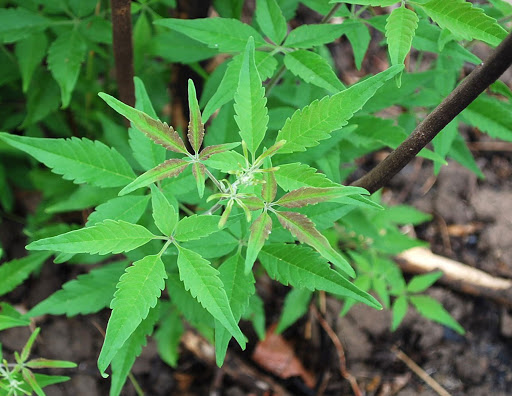200 volunteers join ‘lagundi’ trials
MANILA, Philippines — Despite the skepticism of Western-oriented physicians, Filipinos have been using different parts of the Vitex negundo plant (known as lagundi in Tagalog and dangla in Ilocano) to treat various ailments long before Jesuit missionaries wrote about it in 17th-century chronicles.
Many of the claims of folk apothecaries have been validated by several scientific studies, dating back to the 1980s, both in the Philippines and India, where the plant is known as nirgundi.
With the current challenge of COVID-19, the Department of Science and Technology (DOST) is preparing to start clinical trials on lagundi’s efficacy in treating the symptoms that accompany the respiratory ailment that has hit more than 200,000 Filipinos.

Lagundi (Vitex negundo) —PHOTO COURTESY OF DOST
FDA approval
Science and Technology Secretary Fortunato dela Peña said the trials would involve about 200 volunteers in the quarantine centers of the Quezon Institute, Philippine National Police, both in Quezon City, and Sta. Ana Hospital in Manila. The trial will be conducted by the Philippine General Hospital.
Dela Peña announced the start of the study after the Food and Drug Administration (FDA) approved last week the clinical trials for lagundi as a treatment for COVID-19.
“Our goal is to address symptoms, such as cough, fever and sore throat. because it is important if our patients who are mild cases would get relief from these symptoms,” he said at the government’s Laging Handa briefing on Saturday.
In 1974, several universities and government agencies formed the National Integrated Research Program on Medicinal Plants to validate the claims of folk apothecaries. Among the scientists involved in the study were noted physicians Nelia Cortez-Maramba and the late Conrado Dayrit.
Therapeutic uses
Lagundi was one of the 10 plant species approved for therapeutic uses and it was soon produced commercially under a cough syrup patent owned by the government. The syrup was soon expanded to tablets and is now marketed under brand names, such as Ascof, Plemex and Lagundex.
Aside from lagundi, Dayrit, one of the country’s leading pharmacologists and cardiologists who died in 2007, was also involved in research on coconut oil, which was a target of the US soybean industry because of its growing popularity in the 1970s and 1980s.
The use of coconut oil thus diminished for cooking but Dayrit’s work, started in the 1960s, sparked renewed interest in the health benefits of virgin coconut oil (VCO) all over the world.
Moreover, the science secretary said the essential oils of coconut are also being studied in other parts of the world after in vitro, or laboratory, trials showed a reduction in the infectivity of novel coronavirus that causes COVID-19.
Dela Peña said the DOST’s own trials on VCO in Sta. Rosa, Laguna, may be completed soon and may even be expanded to Valenzuela City after three-fourths of the conditions of volunteer-patients in Sta. Rosa showed improvement. “But we still need an analysis and formal report,” he added.
Russian vaccine
Dela Peña said the country will also be involved in the clinical trial of the Russian COVID-19 vaccine, Sputnik V, but they are still awaiting key developments.
One is the decision of the World Health Organization (WHO) on whether to include Sputnik V in WHO’s ongoing Solidarity trial.
The Philippines’ vaccine panel expert head, Dr. Nina Gloriano, has been designated as a member of the WHO panel that would recommend the vaccines to be used in the solidarity trials, Dela Peña noted.
“If Sputnik will undergo trial in the Philippines, this would likely be under the independent trials category because I don’t know if it would be included in the WHO Solidarity trials. We’re still waiting for the announcement of the WHO,” Dela Peña said.
He also said the Philippines and Russia have also been working on a confidentiality agreement on the data from the Russian trials prior to the approval of Sputnik V. Filipino experts would have to study the data before it is approved by the FDA. —With a report from Ana Roa, Inquirer Research
Disclaimer: The comments uploaded on this site do not necessarily represent or reflect the views of management and owner of Cebudailynews. We reserve the right to exclude comments that we deem to be inconsistent with our editorial standards.
